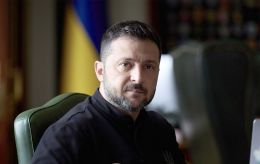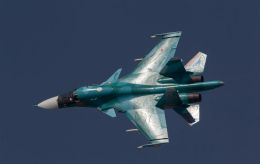Ukraine's struggle for sovereignty and missed NATO membership: Insights from participant in events
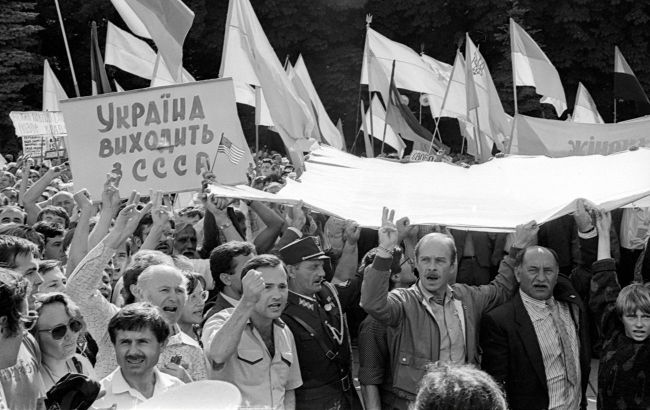 Photo: Proclamation of the Act of Independence of Ukraine (Wikipedia)
Photo: Proclamation of the Act of Independence of Ukraine (Wikipedia)
How was the fateful decision on the proclamation of sovereign Ukraine adopted? What disputes raged between the communists and the opposition around the Act of Independence? How did the world react to the collapse of the USSR, what mistakes of the first government led to the war, and why did we lose nuclear weapons – in an interview with RBC-Ukraine below.
Key questions:
-
The August putsch and the "last days" of the communists: what events preceded the collapse of the USSR?
-
The path to Independence: how did the historic vote on August 24, 1991, take place?
-
The Act of Independence: who and how actually created the document?
-
Confused USA and Baltic support: how did the world perceive Ukraine's independence?
-
Mistakes of the first government: the consequences of which actions Ukraine still feels today?
-
Price of non-nuclear status: why did Ukraine lose a strategic chance?
-
Will Ukraine be able to become a nuclear state again?
Ukraine celebrates 34 years since the restoration of independence in 1991. For almost a third of this time, our state has been fighting for the right to be sovereign and to determine its future independently.
"In the first years, we experienced euphoria from the independence of Ukraine, but the lack of state experience among many members of the People’s Movement and the communist majority in parliament and government strongly influenced the vector of our state’s development," says a direct participant in the proclamation of the Act of Independence, People’s Deputy of Ukraine of five convocations, representative of the People’s Movement of Ukraine, Minister of Environmental Protection and Nuclear Safety in 1992–1998, Yuriy Kostenko.
RBC-Ukraine asked Yuriy Kostenko about the events that led to Ukraine gaining sovereignty, how the fateful vote for independence took place, and which actions of the first government proved critical for the country.
Path to Independence: from the putsch to the historic vote
– What were the socio-political circumstances on the eve of the proclamation of the Independence of Ukraine? Was it already clear that fundamental changes were approaching?
– Public activity in 1989–1991 was on the rise, and very rapidly. In 1991, they were supposed to sign a new union treaty, since the previous one – on the creation of the USSR – had already ended. Within the framework of the treaty, not only the opposition minority, but in general, our Verkhovna Rada was already raising questions differently about the essence of Ukraine – it had to be a real subject in the union entity similar to the European Union, if that would even happen.
We, the opposition minority, mostly represented by members of the People’s Movement, clearly saw the outlines of a fundamentally different Ukrainian SSR – it would be an independent state, which would only partially delegate certain powers to the center.
Even the communist members of parliament and the parliamentary majority doubted the further effectiveness of the Union in the form it was. At least because the union budget stopped fulfilling obligations to the Ukrainian budget, primarily regarding the liquidation of the consequences of the Chornobyl catastrophe.
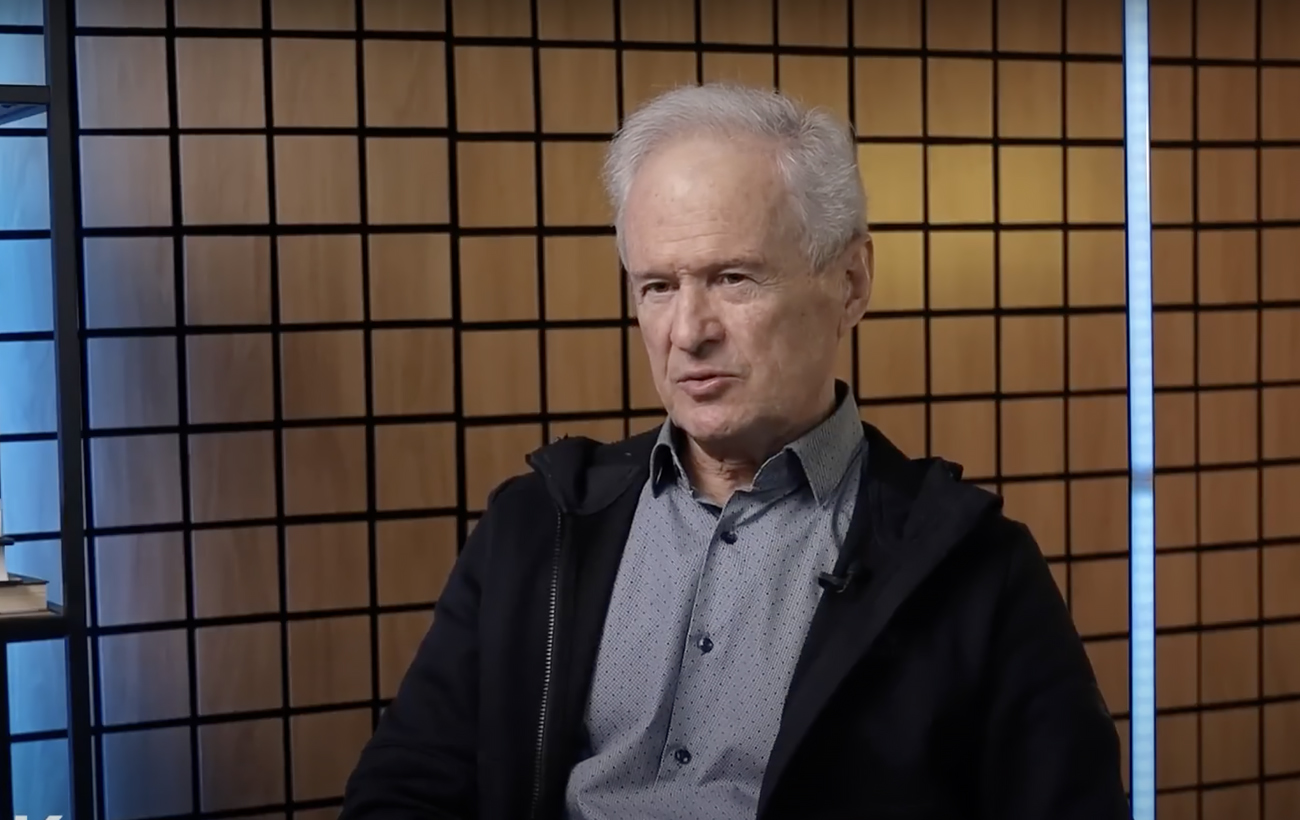
People's Deputy of Ukraine for five terms, representative of the People's Movement of Ukraine, Minister of Environmental Protection and Nuclear Safety 1992-1998 Yuriy Kostenko (screenshot)
And against this background, on August 1, 1991, in the Verkhovna Rada, there was the speech of US President George Bush Sr., who, after signing the START-1 agreement with Gorbachev in Moscow on the reduction of strategic offensive arms, came to Kyiv. And here, from the rostrum of the Verkhovna Rada, he declared support for "perestroika," about "suicidal nationalism," and independence of Ukraine, which the USA was not going to support.
Then, most of the opposition, which had been paving the way to the Declaration of State Sovereignty of Ukraine, adopted a year earlier, smiled ironically at this completely detached-from-reality speech, because it sharply contradicted everything that was actually happening in Ukraine.
By the state of society and Ukrainian politics, we have already seen that our independence is approaching.
– How significant was the role of the putsch of the State Committee on the State of Emergency (SCSE) in accelerating the proclamation of our independence?
– The putsch definitely accelerated the collapse of the USSR. In this process, the experience of the Baltic countries played an important role. Latvia, Estonia, and Lithuania, back in 1990, after parliamentary elections, in their first decisions restored the validity of the Constitutions as independent states, which they were before their annexation by the Union.
And this led, in particular in Lithuania, to an attempted coup, when Soviet special forces tried to seize state institutions and the television tower. Protesters’ blood was shed, and then the USA, in quite harsh form, warned Gorbachev about possible consequences if he did not withdraw the troops.
The examples of the Baltic states paving their way to independence we used in our struggle too, just remember the “chain of unity” of Ukraine in 1990.
Returning to the Moscow putsch, I remember the first minutes of the announcement at 6 a.m. that power had passed to the SCSE. All radio stations broadcast its decrees. I immediately went to the Verkhovna Rada and saw completely bewildered communists – the heads of some committees, Kravchuk, and members of the People’s Council, that is, the opposition. But many were not yet there, as parliamentary holidays were still ongoing.
The communists did not understand what to do and were very afraid, while the democratic opposition minority immediately began to demand that Chairman of the Verkhovna Rada Leonid Kravchuk urgently convene deputies for an extraordinary meeting.
But Kravchuk was already called in the morning by then-commander of the Kyiv Military District General Valentin Varennikov, who informed that power was transferred to the SCSE and that now the Verkhovna Rada of Ukraine must obey their decisions. By the way, then-head of the Communist Party of Ukraine, Stanislav Hurenko, declared that the communists would follow all orders of the new power in Moscow.
Already after lunch, many oppositionists arrived at the Verkhovna Rada and we began to draw up a plan of action. We decided to go to enterprises and organize meetings with voters to talk about rejecting SCSE decisions and promoting independence.
I met with the staff of the Paton Institute and the military factory Komunist. At the institute, they warmly welcomed the ideas of independence, but at the factory, people were restrained.
On the evening of August 19, we gathered at the Union of Writers of Ukraine, and Levko Lukyanenko had already mentioned that he was working on the text of the Act of Proclamation of Independence. The next day, the People’s Council (the parliamentary opposition in the Verkhovna Rada of Ukraine from 1990 to 1994) received the document and adopted it almost unanimously.
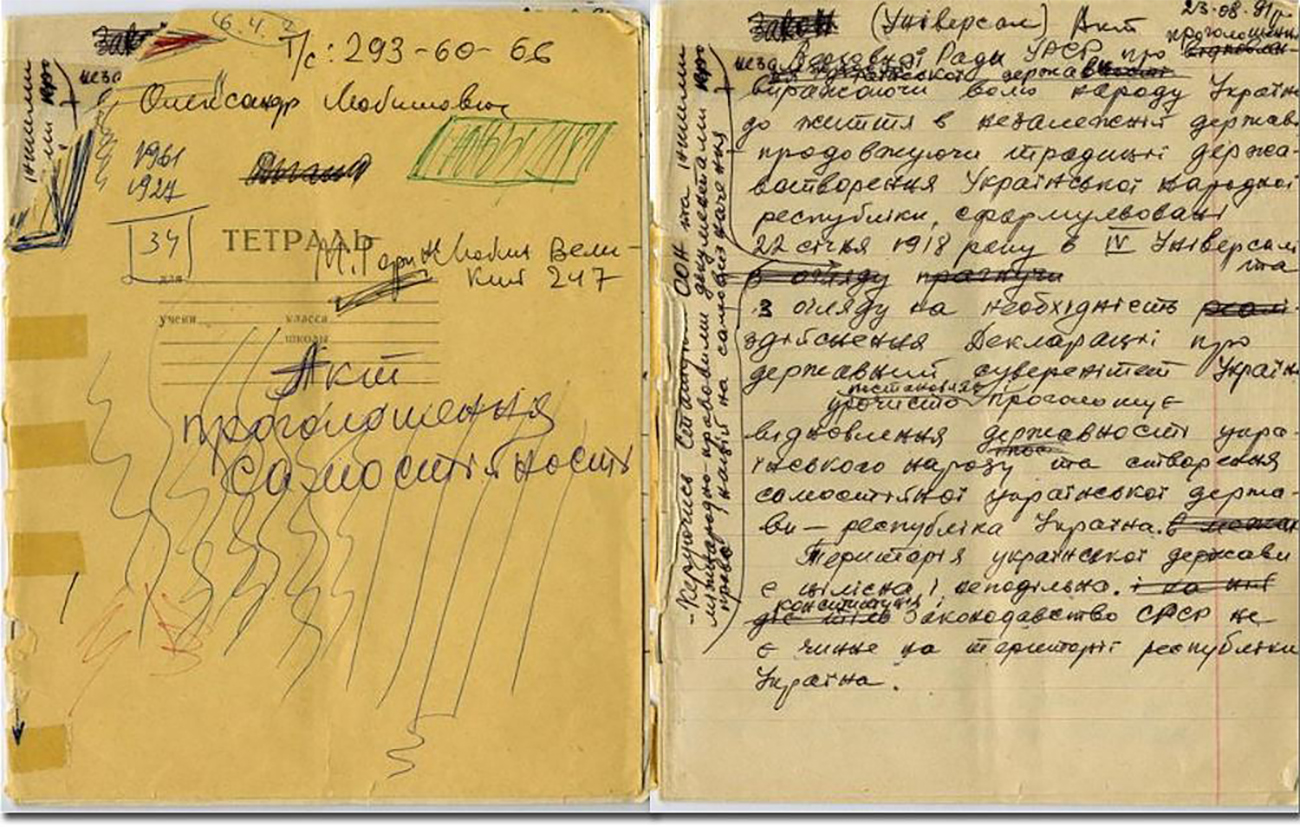
Draft of the Declaration of Independence (photo: Wikipedia)
Later, we created working groups to draft other laws to be considered at an extraordinary meeting of the Verkhovna Rada. In particular, several documents have been published regarding the invalidity of Soviet laws in Ukraine, which allegedly violate the state's sovereignty.
Within a few days, the putsch in Moscow failed when the Taman Division refused to crush protesters with tanks, who came out onto the streets under Yeltsin’s leadership. And it was then that the head of our Verkhovna Rada, Kravchuk, signed an order on an extraordinary session, scheduled for August 24.
Therefore, the SCSE undoubtedly played a crucial role in triggering the collapse of the USSR. However, legally it still existed until December 8, 1991, when Russia, Ukraine, and Belarus signed the Belovezh Accords on the dissolution of the Union.
– How do you assess the actions of the then-communist authorities in Ukraine, in particular Kravchuk?
– Kravchuk, in the first hours of the SCSE, maneuvered between the communists and the opposition minority. When Hurenko and Varennikov on August 19 told him to obey SCSE decisions, Kravchuk played for time. He said he could not decide himself, but must gather the presidium of the Verkhovna Rada. It was indeed gathered, but a few days later – when the SCSE already showed its incapacity to keep control. The presidium supported Kravchuk’s proposal for an extraordinary session of the Verkhovna Rada on August 24.
In fact, the communists were divided. Part of the communist-statists already in 1991 shared the views of the People’s Council, several dozen even before these events suspended their membership in the CPSU and moved to the opposition minority.
The smaller part of the communists – the orthodox led by Hurenko. They were radical and tried to convince Kravchuk to support the SCSE. However, on August 19, people in Ukrainian squares, primarily in the West, began to gather, adopting resolutions in support of independence. That is, a process of disobedience to the SCSE was forming. The authorities also saw this.
A significant part of the communists were confused – wherever the majority would go, they would go. Thanks to this, we voted for the Act of Independence and the first laws already as a sovereign state.
– Were there attempts to postpone the vote or disrupt it?
– At the extraordinary session, we came with more than a dozen prepared draft laws. The main attention was focused on the proclamation of Ukraine's Act of Independence. Then, almost the entire composition of parliament gathered – deputies urgently returned from vacations.
The atmosphere in the session hall was very tense. On one side, representatives of the democratic minority advocated independence against the background of the failed putsch, on the other, legally, the Soviet Union still existed.
Part of the communists kept silent fearfully, but part, led by Hurenko, attempted to slow down the process in their speeches. This caused a storm not only in the session hall but also outside, where at least 50–70 thousand people gathered near the Verkhovna Rada, chanting slogans for independence. Encouraged by popular support, deputies literally drove Hurenko away from the rostrum, threatening reprisals.
At this time, in the corridors of the Verkhovna Rada, active work was underway on the final version of the Act of Independence. The conciliatory commission mostly approved Lukyanenko’s draft. This work was led by Ihor Yukhnovskyi, the head of the People’s Council, an academician. I also participated in this work, along with Oleksandr Moroz, who represented the communist majority. He mostly kept silent and hardly argued about the text of the Act of Independence, looking pale and very tired.
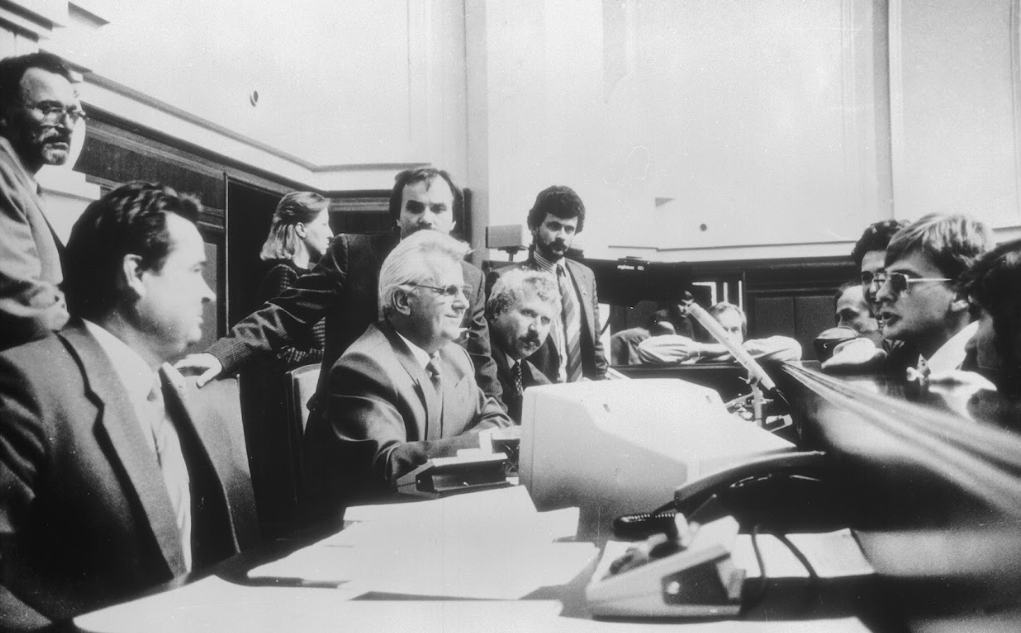
Presidium of the extraordinary session of the Verkhovna Rada on August 24, 1991 (photo from open sources)
The sharpest discussion occurred not even between us and the communists, but when Yukhnovskyi suddenly proposed to put the Act of Independence to a nationwide referendum. Many deputies from the People’s Council did not accept this.
They argued that the Verkhovna Rada had the legal authority to adopt any decisions on behalf of the Ukrainian people. Therefore, there was no need to put this issue to a referendum. The discussion was dragging on, while in the session hall, they demanded an immediate vote for the Act of Independence. Kravchuk delayed the time to obtain the final version of the document, but it was not available. The degree of tension was rising.
Then Ihor Yukhnovskyi declared that the decision of the Verkhovna Rada on independence could be changed if another composition of parliament were elected. But if the Act was backed by the will of the Ukrainian people, no one could change it, except by holding another referendum.
But everyone understood that with a new referendum, independence would never be canceled. And that was the final argument of Yukhnovskyi, which convinced everyone to support holding it.
While the discussion of Yukhnovskyi’s proposal with Kravchuk was underway, we were editing the final text. There was only one amendment from Dmytro Pavlychko regarding the preamble, namely: "Proceeding from the mortal danger that hung over Ukraine in connection with the state coup in the USSR on August 19, 1991…"
I want to note that despite Lukyanenko’s authorship of the Act, it was first read from the rostrum of the Verkhovna Rada by Volodymyr Yavorivskyi.
By the way, the referendum showed striking results – more than 90% of the population supported the Act of Independence of Ukraine, and more than 50% in Crimea. This ruined the Kremlin’s plan, which was that the USA would not recognize Ukraine until we signed obligations to give all nuclear weapons to Russia.
Because, after the referendum began, an avalanche of recognition of our state ensued. First, Canada did it, then Poland. And the USA had nowhere to go. Therefore, the referendum was a farsighted decision that influenced the further course of events.
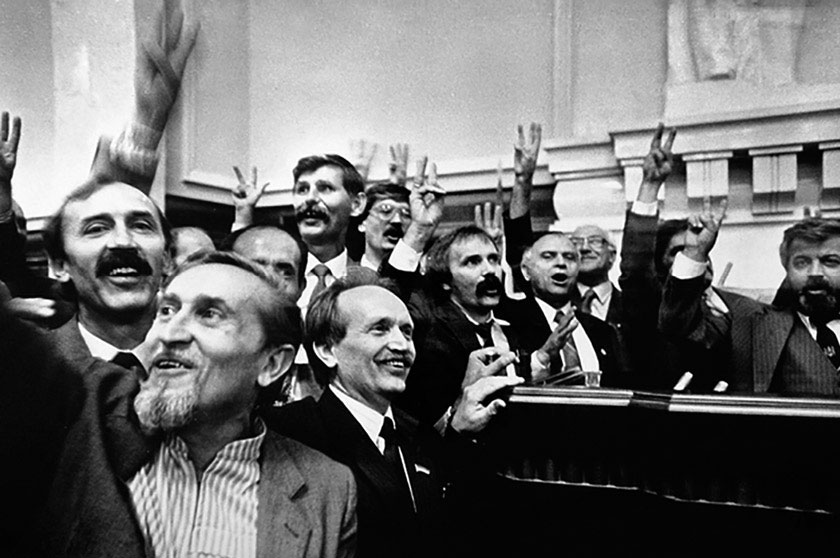
The atmosphere in the Verkhovna Rada after Ukraine declared independence (photo from free sources)
Kyiv on the days of proclamation: euphoria, personal threats, and reaction of the world
– Were there then threats to the lives of deputies-initiators of the proclamation of independence? Were you persecuted?
– At that time, I absolutely did not think about threats; I was moved by emotional uplift – that here and now, there would be independence, democracy, Europe. The communists after the proclamation of the Act crossed themselves and swore, begged in the lobbies: "Just don’t kill us, because we are also for independence."
Already about a year after the collapse of the Union, the communists came to their senses, and one of those who earlier had begged not to kill him came up to me with the words: "If the coup had succeeded, then all of you would have been gone from this world long ago."
Therefore, in fact, there were threats to us. I am sure that when we gathered rallies at the enterprises, KGB (Committee for State Security) agents followed us, who received instructions from the Kremlin to restrain the Rukh (People's Movement of Ukraine party) members.
– Do you remember what Kyiv was like after the proclamation of independence? Was there anxiety or a state of euphoria?
– There was complete euphoria. Those who came out to the Maidans had no fear before the State Committee on the State of Emergency (GKChP). It was a total celebration. All of Maidan and Khreshchatyk roared "Victory! Victory! Victory."
Somewhere towards evening, it was decided to raise the national flag over parliament. And then some blockheads from the apparatus of the Verkhovna Rada hung next to the national banner the flag of the Ukrainian SSR. When people saw this, they rushed to storm the Verkhovna Rada. The deputies, frightened, immediately took it down and raised only the blue-yellow flag. That was a great day in Ukrainian history.
– How did the world perceive the news of Ukraine’s independence?
– Everyone was bewildered, starting with the stronghold of democracy, the USA. The thing is that America led the Cold War with the USSR, but was not preparing for its collapse, about which the US President Bush Sr., in fact, spoke in parliament a few weeks before this. As is known, in 1947 Churchill proclaimed his famous Fulton speech about the fact that instead of destroyed Nazism another threat had arisen – communism. And, according to his words, it was even more dangerous.
Churchill said that to win the war with communism was impossible, because there were nuclear weapons that could destroy the world, and therefore it was necessary to do this in a peaceful way – by means of the competition of democracy with the totalitarian USSR.
In fact, the Cold War led to the peaceful fall of the Soviet dictatorship. Reagan’s policy generated expensive "Star Wars," which in the end caused the biggest collapse of the USSR economy. Namely, in the arms race, both nuclear and space, the totalitarian economy could not withstand competition and collapsed. That is, the USA was the moderator of this process, but when the Union collapsed, they were bewildered, like children, because they had not worked through the question of what they would do after the collapse of the nuclear USSR.
And here’s the strange thing. Because when Bush spoke in support of Gorbachev and said nothing about the collapse of the Union, I have a question to American intelligence and analytical services – not one of them calculated the option of collapse.
I emphasize this not in vain. Just recently, there was a meeting of Trump and Putin – and what? Again, just like then, when the USA was not ready for the collapse of the nuclear USSR, so now they close their eyes to the fact that nuclear Russia can collapse. And not in 100 years, but much sooner. The Russian Federation is an imperial formation, and it is moving toward disintegration. This is a natural process that no one will stop: no negotiations of Trump with Putin, no lifting of sanctions.
Returning to our question, the democratic world was completely unprepared for the collapse of the USSR. However, the countries that had undergone the Soviet totalitarian system rejoiced at the collapse, as they saw it as an opportunity for their own independent development, free from threats from the USSR.
Instead, the generators of the "collapse" of dictatorship, in particular the USA and governments of European democracies, were horrified and bewildered. They had no recipes at all for what to do with it, in particular with the nuclear weapons of the Soviet Union. And with how dangerous the uncontrollability of these processes would become.
Mistakes of the first power: non-dissolved parliament and Kremlin influence
– Looking back, what main mistakes of the first Ukrainian government can you highlight, which were made after the proclamation of Independence?
– Two things were the worst for the further development of independent Ukraine. The first – whether to leave the Verkhovna Rada, which had a communist majority, or, together with the presidential elections and the referendum on December 1, to appoint early elections to parliament.
This issue was dealt with by the People’s Council. Ihor Yukhnovsky held several discussions, and only a small part of the MPs, first of all the dissidents who had passed through concentration camps, supported the idea of dissolving the Rada and holding early parliamentary elections.
Very radically, for this stood Stepan Khmara. A small part of the People’s Council supported this idea, but it was actively opposed by Pavlychko.
Kravchuk listened to Pavlychko’s advice. He stated: "If we dissolve the Verkhovna Rada with the communists who supported us, then what the Rada of the next convocation will be – is unknown. If we lose the support of the communists, we can lose the independence that was barely born. They can carry out a coup, like the GKChP(State Committee on the State of Emergency) in Moscow."
I believe that someone was whispering these narratives to Pavlychko in the corridors of Ukrainian power, which were filled with KGB representatives. Because of this structure, despite the defeat of the GKChP, it continued to act among us. Only the name changed from KGB to SBU. No reforms or purges were carried out in the SBU, unlike in the Baltic states. The reason for this was the appointment of former KGB general Marchuk as head of the SBU.
I can unequivocally state that the biggest political mistake then was the refusal of early parliamentary elections. This would have changed the vector in favor of democratic development. Because when later economic and social troubles began, the communists blamed independence for everything.
In 1994, early elections still took place, but then in society, completely different moods prevailed. Instead of uplift and enthusiasm with democratic ideas, mostly came public discontent, which was also fueled by Russian propaganda.
As a result, after the early elections, democratic forces were again in the minority. Then the communists, by the way, went to the elections with the slogan: "Rukh brought Ukraine to ruin." And this despite the fact that they continued to control the majority of parliament, and without their consent, we could not adopt any law.
Then the communists in the government made up nine-tenths of the 40 ministers and heads of government, with only three representatives of the democratic forces: me, Viktor Pynzenyk, and Ihor Yukhnovsky.
The second main mistake of the then authorities was the manner in which nuclear disarmament was implemented. We inherited the third nuclear potential of the world. It was not just a nuclear mace with which one could destroy any aggressor, it was a colossal starting potential of Ukraine, which gave us the possibility of rapid movement both to democracy, the European Union, and NATO.
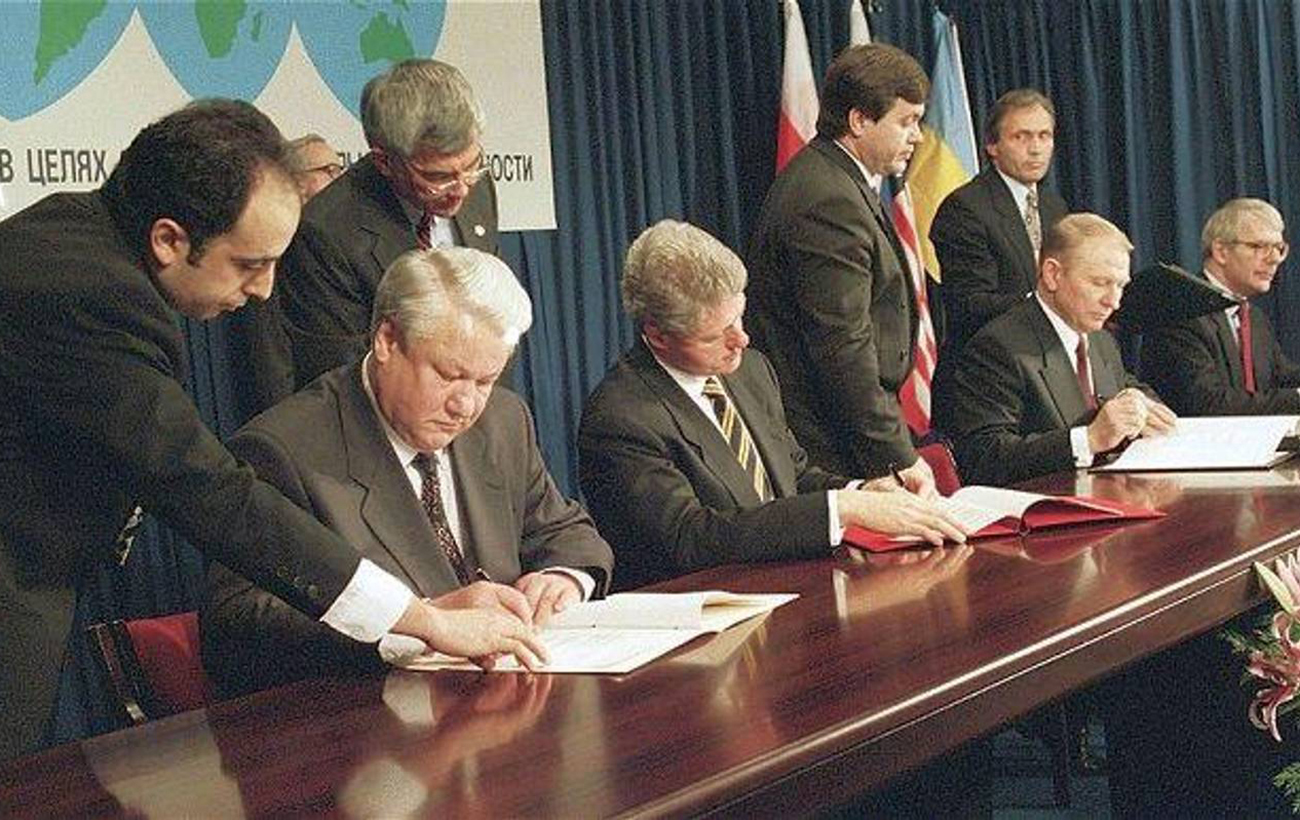
Signing of the Budapest Memorandum (photo: Wikipedia)
In the Verkhovna Rada, I headed the Special Working Commission responsible for nuclear disarmament issues and served as the first head of the government delegation in negotiations on nuclear disarmament with Russia.
As a scientist, I understood these issues deeply. Instead, many of the communist MPs spread KGB horror stories that nuclear warheads would begin to explode by themselves, and it would be a second Chornobyl.
Nuclear weapons are also enormous material values. Their presence opens doors literally into all democratic systems: both in economic and in political cooperation, and in matters of security.
The loss of this colossal starting capital, which took place on June 1, 1996, when the last echelons with strategic nuclear warheads departed to Russia, led to the fact that all these doors, wide open for integration of Ukraine into democracy, closed. And they opened only in 2022 during the full-scale aggression that Russia began.
All this time, Ukraine has been in a gray zone where Russia’s interests have dominated: both militarily, economically, and in terms of security. Therefore, the greatest tragedy of independent Ukraine was the implementation of nuclear disarmament according to the Moscow scenario, and not according to the scenario that the Commission had worked out. Disarmament, in our opinion, was intended to conclude with Ukraine's full membership in NATO and the European Union, alongside the USA. And in which year that would be depended on how we could move towards the final goal – a non-nuclear Ukraine.
The Kremlin conducted the policy of nuclear disarmament of Ukraine through our executive power, and not the Verkhovna Rada. It was used to executing instructions from Moscow, and not to act according to the laws that its own parliament adopted. This concerned the MFA and the SBU, resulting in significant losses. These mistakes turned into the present day, because a full-scale war would never have happened in Ukraine if at least one warhead had remained in our warehouses.
Price of non-nuclear status: why Ukraine lost a strategic chance
– It is often said that Ukraine supposedly could not ensure the maintenance of nuclear munitions. Is this really so, or is it speculation?
– In the media and corridors of power, this Russian fake still dominates; instead, the entire mass of information that is presented in my book "Ukraine's Nuclear Disarmament: History", the Ukrainian authorities do not use.
I remind you that there was not a single decision of parliament regarding the use of nuclear weapons in our military doctrine. In the Declaration on State Sovereignty, which was voted for back on July 16, 1990, it was said that Ukraine sees itself in the future as a nuclear-free and neutral country.
But in the resolutions of the parliament of 1992 and 1993 on Ratification of the Treaty on the Reduction of Strategic Offensive Arms, it was clearly stated under what conditions Ukraine can become nuclear-free. And this was supposed to end with membership in NATO and in the European Union. These decisions the executive power was supposed to observe, but it continued to do what the Kremlin demanded through the Ukrainian MFA, Kravchuk and the government.
Without the decision of parliament, which on behalf of the Ukrainian people is the only one authorized to dispose of its property, and nuclear weapons are the property of the state, the Ministry of Defense of Ukraine gave permission for the export of tactical nuclear weapons.
.jpg)
Nuclear complex Pioneer in the Air Force Museum of Ukraine, Vinnytsia (photo: Wikipedia)
I appealed to the Ministry of Defense with a request for the basis on which they transferred tactical nuclear warheads to Russia. And I received a phenomenal answer – a piece of paper without a signature. However, it had to bear the signature of the Head of the General Staff, stating that the decision was carried out on the basis of the order of the 12th Directorate of the General Staff of the USSR. I remind, at that time there was no longer either the Union, or the General Staff of the USSR…
In this answer, they in fact confirmed that, de jure, the non-existent General Staff of the USSR and this Directorate continued, de facto, to control the Ministry of Defense of independent Ukraine. And such lawlessness at the demand of the Kremlin was implemented by our Ministry of Defense, MFA, and SBU.
For the export of nuclear warheads, it was necessary to obtain permission at the level of the Ministry of Defense. The escort of the special train had to be ensured by Ukrzaliznytsia, and the guard had to be provided by the SBU. That is, the SBU was aware of this. Without the decisions of parliament, this could not be done. And Kravchuk more than once said that he did not give orders about the export of tactical nuclear munitions. Additionally, the customs service had to inspect what was being taken out of Ukraine.
I remind that at this time our parliamentary commission was working out another plan of Ukraine’s movement towards nuclear-free status. In April 1992, the Verkhovna Rada adopted a special resolution on the destruction of nuclear weapons. It emphasized that the movement towards a nuclear-free status had to be accompanied by the provision of financial and technical support to Ukraine, and most importantly, reliable security guarantees.
In response to this parliamentary resolution in December 1992, the US State Department sent a diplomatic note to President Kravchuk, stating that the USA was ready to provide Ukraine with all necessary assistance in nuclear disarmament, which was intended to culminate in Ukraine’s membership in NATO.
Later, the USA sent to the Ukrainian authorities concrete proposals regarding ensuring the security of nuclear warheads in the process of their destruction, reprocessing of highly enriched uranium into nuclear fuel for Ukrainian NPPs, and safe technologies for disposal of strategic carriers. And most importantly, the USA proposed creating an International Fund to finance Ukraine’s nuclear disarmament.
I remind that the cost of the program of partial destruction of strategic arms (36% of strategic carriers and 42% of nuclear warheads), which the START-1 Treaty envisaged, was according to American estimates 6 billion dollars. The Ukrainian budget at that time amounted to about 10 billion dollars. So count yourselves…
This scenario was on the table of President Kravchuk and the MFA. But there was a colossal betrayal of state interests by the authorities.
In November, the Verkhovna Rada adopted ratification of the START-1 Treaty. The law provided only partial destruction of nuclear weapons; this process was supposed to last 7 years. However, after the exchange of ratification instruments in Budapest and receiving the so-called security guarantees for Ukraine, all without exception, nuclear warheads were exported to Russia in 2.5 years, because as Kravchuk constantly emphasized, nuclear warheads would begin to explode.
From my side, I want to say that Ukrainian specialists who worked at nuclear enterprises of Russia passed to the parliamentary commission information that the guarantee terms of strategic nuclear munitions in Ukraine expired only in 2004. Moreover, the guarantee term means only that nuclear warheads will work in case of their use. Ukraine did not plan to use them, and therefore to store them in warehouses for further reprocessing into nuclear fuel, we could for decades.
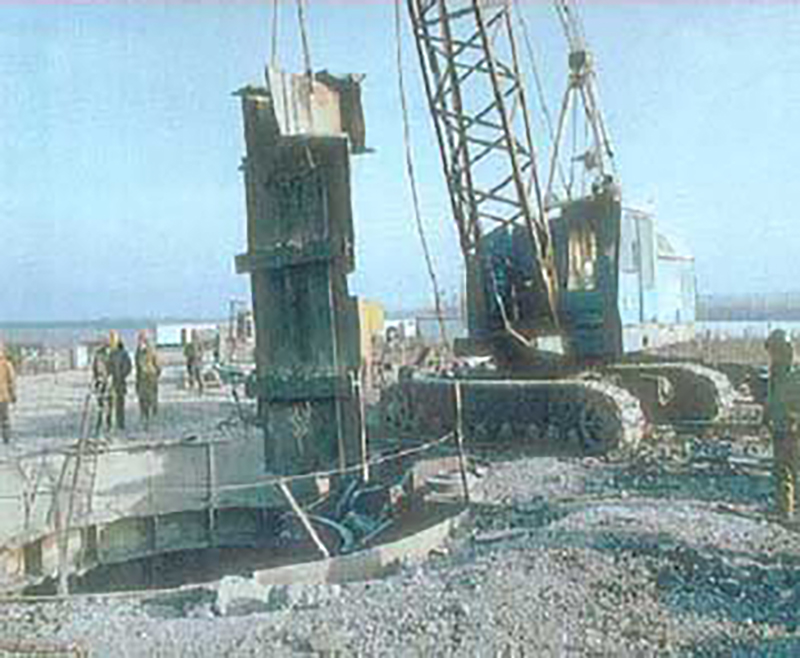
Liquidation of the SS-24 missile silo in Pervomaisk (photo: Wikipedia)
– How can the world’s irresponsibility regarding the non-fulfillment of the Budapest Memorandum be explained?
– Global responsibility for security guarantees is yet another fake generated by Russia. I emphasize that in December 1992, the USA offered Ukraine, as a security guarantee after the destruction of nuclear weapons, membership in NATO.
Literally three weeks after these statements, a Ukrainian delegation headed by then Deputy Minister of Foreign Affairs Borys Tarasyuk came to the USA. It was the Ukrainian delegation in the State Department that began to speak not about membership in NATO, but about some paper guarantees of security. At the same time, as the American press wrote, the Americans shrugged their shoulders, not understanding: what kind of papers can there be, if your guarantee of security is membership in NATO?"
Just a few days later, as the same American press wrote, it became known that the paper security guarantees of Ukraine were needed by the Ukrainian MFA delegation in order to convince the Ukrainian parliament to vote for the ratification of the START-1 Treaty on the reduction of strategic offensive arms. What our MFA and its delegation were doing – this is 100% execution of an order from the Kremlin.
It is worth emphasizing that in no decision of the parliament is there permission to transfer nuclear warheads to Russia. It was about their destruction. There were also no decisions about blowing up silo launchers. But the negotiations were conducted by the executive power, which was guided not by decisions of parliament, but by instructions from Moscow.
– Can Ukraine once again become a nuclear state?
– Everything is possible with modern technologies and the availability of funds. North Korea, which was under sanctions, had nothing to eat and nothing to wear, but it managed to make its own nuclear weapons. Iran also for 30 years has also been trying to become a nuclear state.
When we talk about nuclear weapons of Ukraine, first of all, we must look at whether we have the finances for this. Neither today, nor tomorrow, nor the day after tomorrow will such funds exist in the Ukrainian budget, because we will face colossal difficulties in restoring the economy and addressing large-scale social problems after the war.
Today, we cannot build production for uranium enrichment or the extraction of plutonium, because every square meter of land is being attacked by Russia. Also, we do not have a testing range where nuclear explosive devices can be tested.
But if we speak about the ability of Ukrainian scientists for development, or the availability of a technological base, then theoretically we can speak about nuclear weapons of Ukraine.
By the way, the first nuclear warhead in the Soviet Union was made from Ukrainian uranium from Zhovti Vody. Ukraine was also closely embedded in the creation of nuclear weapons in the form of ballistic missiles. Even today, we are number one in the world in technologies to produce powerful ballistic missiles, capable of carrying 10 nuclear warheads at an enormous distance. Neither Russia nor the USA can repeat the type of carrier SS-18 Satan, which was produced by our Pivdenmash.
However, at the same time, there is a sense in speaking about Ukraine as a potential participant in the pan-European security strategy, primarily in the creation of the so-called nuclear umbrella over the EU and NATO. Today it is provided by the USA. After all, 300 nuclear warheads in France and 250 in Britain are insufficient for strategic nuclear parity with Russia.
Thus, Ukraine has a real perspective of participation in the creation of a new strategy of European security. Therefore, after the war, all efforts must be directed there: scientific, military, and technological.
– How do you relate to statements that in 1991 we received independence, but did not gain it with blood?
– To those who say such a thing, one must recommend reading the history of Hrushevsky, Braichevsky, and Dashkevych, where all the stages of Ukrainian state-building are comprehensively described. Not every nation can be proud of such an eloquent history and heroic struggle.
The problem with Ukrainians is the quality of power. As the authorities once did not know their history, so now officials, unfortunately, do not know it and continue to repeat the narratives of the Kremlin, including regarding the origins of our statehood. First of all, this concerns the topic of the princely Ukraine-Rus.
The Kremlin leader does not tire of convincing the whole world and most of all Ukrainians that Rus is Russia. In fact, academician Hrushevsky and his numerous followers scientifically substantiated the conclusion that the thousand-year Rus was the first Ukrainian state, created not by a triune people, but by the Ukrainian ethnos. The conclusions of respected academic scholars utterly smash Kremlin propaganda, but how many in Ukraine are speaking about them?
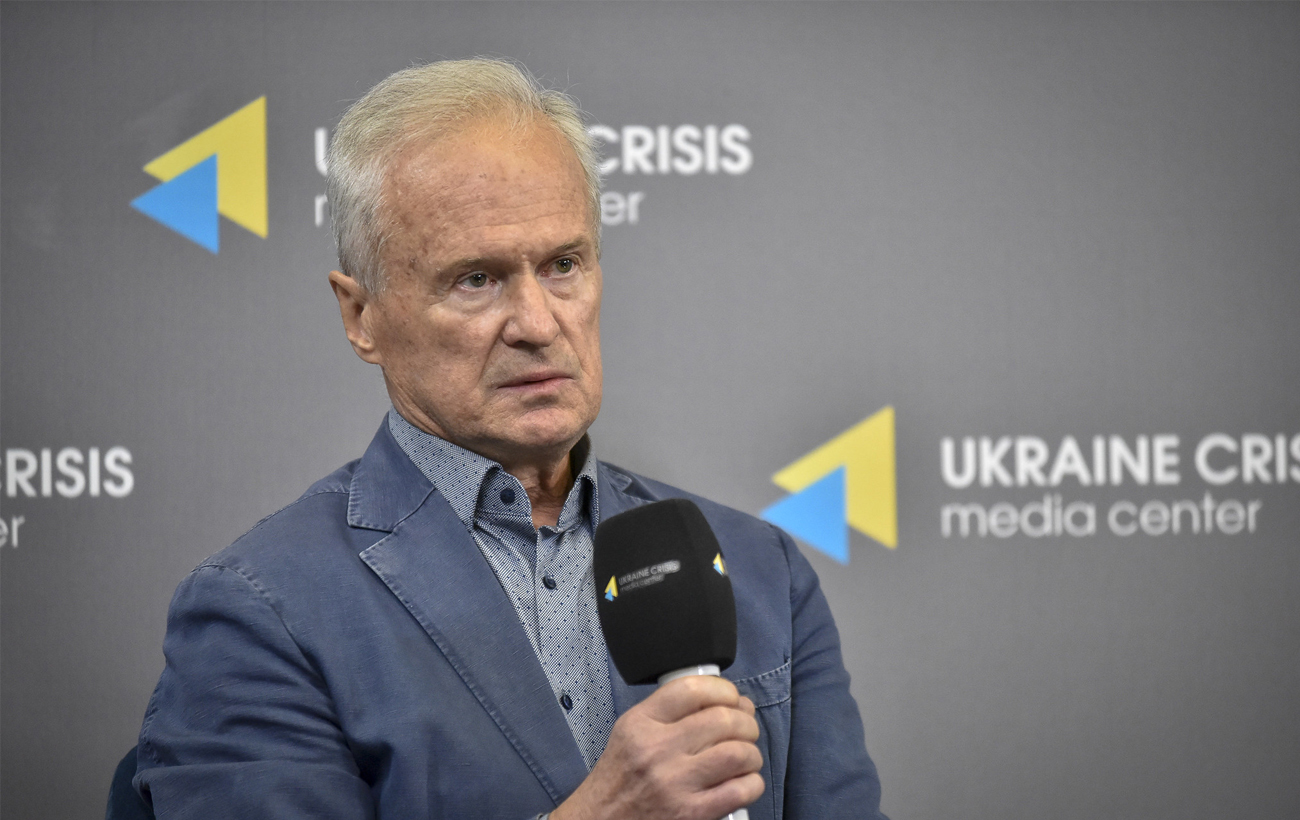
Yuriy Kostenko: "The problem of Ukrainians is in the quality of power. As the authorities once did not know their history, so now officials do not know it and continue to repeat Kremlin narratives about the origins of our statehood" (photo: uacrisis.org)
– The future of Ukraine directly depends on how quickly Russia collapses. What will be the key in this process?
– The key will be the stopping of hostilities and the signing of an agreement on a truce. A peace agreement is impossible because it presupposes that we renounce our territory, which contradicts the Constitution and would be a crime.
However, in the case of agreements about a ceasefire, two Germanys existed after the Second World War, and North and South Koreas exist today after the Korean War, under such conditions. Similarly, Cyprus exists today. This makes it possible to stop Russia’s barbaric war against Ukraine.
By my estimate, within a decade, Russia as an imperial formation will disappear from the world's political map. After all, after the end of the war, no one knows how quickly to transfer the Russian military industry to a peaceful channel. This requires years, even decades, and a colossal amount of funds.
The Union collapsed on a wave of social troubles; exactly the same will happen with Russia. I remind you that after the collapse of the USSR, the USA adopted a special law on assistance to Russia in nuclear disarmament, and the West also provided colossal financial support to the Russian Federation to prevent it from further collapse.
And who now will pour such funds into Russia? Russia drove out private business, and Western sanctions stopped business activity there. All investment companies will watch for a long time to see what will happen further with the Russian Federation. Therefore, in 5–10 years, all territories occupied by Russia will return to Ukraine, and the empire itself will fall apart into different components.
No matter how Putin twists his deceitful propaganda, world experience convincingly testifies – empires disappear, and mostly after great wars. Austro-Hungarian after the First World War, British after the Second. So it will be with Russia after its barbaric large-scale aggression against Ukraine.
